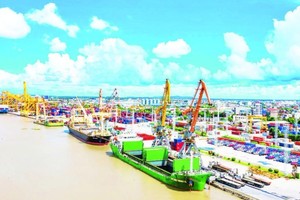The Ministries of Industry and Trade, and Agriculture and Environment jointly held a conference aimed at boosting trade in agro-fishery-forestry products between Vietnam and the US in Hanoi on May 9.

Speaking at the event, Minister of Agriculture and Environment Do Duc Duy called on Vietnamese businesses to take a more proactive role in enhancing competitiveness and standardising production processes amid growing trade challenges, particularly from the US.
He warned that the US’s potential imposition of high reciprocal duties could create serious pressure on Vietnam’s key export sectors.
The US remains Vietnam’s largest export market for agricultural, forestry and fishery products.
In 2024, exports to the US reached over US$13.7 billion, accounting for 22 percent of total sector export value. In the first four months of 2025, the figure rose to US$4.34 billion, up 10.2 percent year-on-year.
Key products, including wood and wood products, seafood, cashew nuts, pepper and fresh fruit, have established a solid foothold in the US and are well received by American consumers. The US currently leads in market share at 20.5 percent, followed by China (17.1 percent), the EU (13 percent) and Japan (7.5 percent).
However, he noted that US considerations of reciprocal duties of up to 46 percent are putting immense pressure on Vietnamese exports. In response, the Government has swiftly implemented a range of measures – from developing action plans and engaging in negotiations with the US, to organising a business delegation to the US this June.
“So far, nearly 40 enterprises have registered for the trip, with a projected import value of US$2 billion in raw materials – excluding timber,” he said.
Despite these efforts, the minister pointed out serious gaps in Vietnam’s supply chain management, describing it as fragmented, non-transparent and not yet aligned with international standards for labour, environment and traceability.
This, he explained, leaves Vietnamese goods more vulnerable to trade investigations and tariff measures.
He called on enterprises to increase investment in deep processing technologies, cold chain logistics and quality control systems. He urged stronger linkages with farmers and cooperatives under value chain models, along with better responsiveness to new US market regulations and trade investigations.
He also emphasised the need for export market diversification, greater focus on the domestic market, effective use of signed free trade agreements and active participation in policy advocacy and international legal matters.
“We must not rely solely on tax incentives or temporary advantages. Without meaningful change, the US market may no longer be an opportunity, but a barrier to growth,” he said.
To support two-way trade balance, the Minister encouraged Vietnamese firms to explore greater imports of US-origin agricultural, forestry and fishery inputs for domestic production.
The Ministry of Agriculture and Environment has introduced an export plan for the US, focusing on clearer supply chains, digital traceability, stronger branding and greener farming to meet tough environmental standards in key markets like the US, EU and Japan.
“The Government, the Prime Minister and relevant ministries will continue to accompany businesses with concrete support in terms of institutions, policy and technical guidance – especially during difficult periods,” he confirmed.
However, he emphasised that keeping access to the US market and raising the global profile of Vietnamese farm products depends mainly on businesses making real strategic changes and taking clear action.
























